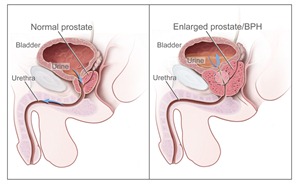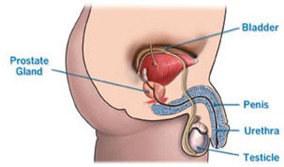The symptoms of BPH are the reason why most men come to a Urologist’s office for help. So, what is BPH, and what do the letters represent?
The B stands for benign that is, a non-cancerous condition that can make you miserable but not kill you.
The P stands for prostate, the gland in front of the bladder through which we urinate. The prostate makes secretions that comprises about one half of the ejaculate during orgasm.
The H stands for hyperplasia, a condition in which the cells of an organ reproduce more than normal cells that are present and the organ gets larger.
BPH is very common symptomatically affecting more than 50% of men in their 60’s and the problem increases with aging. It is much more common problem than prostate cancer (it is present in 80% of men aged 70 to 79) but both can exist at the same time.
 What happens when the prostate gland enlarges is that makes it harder for men to urinate. It becomes harder to start the stream. The stream becomes slower and weaker so that it takes longer to empty a full bladder. The stream may become so weak that the bladder does not empty properly. That starts a secondary effect because the bladder is left full and there is an increased need to empty a partially full bladder.
What happens when the prostate gland enlarges is that makes it harder for men to urinate. It becomes harder to start the stream. The stream becomes slower and weaker so that it takes longer to empty a full bladder. The stream may become so weak that the bladder does not empty properly. That starts a secondary effect because the bladder is left full and there is an increased need to empty a partially full bladder.
The problem is day and night so that sleep becomes interrupted to go to the bathroom to void at night. That doesn’t bother some men, but other men who cannot go back to sleep are miserable. As the bladder begins to fight the obstruction of the prostate it may become irritable and cause urinary urgency and when really profound, cause urge incontinence; a problem that can cause the man to “pee in his pants’ if a bathroom is not nearby. That can be a problem in a car stranded in a traffic jam or on the street when there are no public rest rooms.
I have highlighted the word bother: that will determine if and when treatment is needed. When men are bothered to the point of distraction by those symptoms, they need treatment. Those who are not (“It doesn’t bother me to wake up 4 times a night; I go right back to sleep.”) do not need treatment.
Some men absolutely need treatment for BPH even if they have minimal symptoms. Who are they?
1. Men who cannot empty their bladder or who retain more than 10 ounces of urine in the bladder; they must be treated. Not being able to pee at all is painful and dangerous and an obvious reason for treatment. Men who retain larger and larger amounts of urine in the bladder may block the egress of urine form the kidneys and have kidney failure so they need to be treated to keep the kidneys healthy. Also if the bladder is overly distended for long periods of time it may become scarred and even if the prostate is treated may not be capable of emptying properly.
2. Men who develop bladder stones because they do not empty urine from the bladder as a result of their BPH need treatment.
3. Men who have repeated obviously bloody urine as a result their large prostate need treatment.
4. Men who develop repeated bladder infections because of the BPH need treatment.
The treatments for BPH have changed dramatically over the past few decades. I will review those new therapies in the next blog.
For a consultation with the Dr. Melman about BPH, or any other urology related problems, call today!
